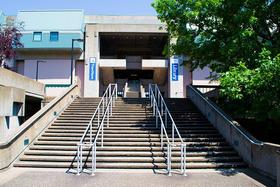- The mission of Pensacola Junior College is to provide quality educational opportunities and support services to meet the requirements of all students pursuing intellectual fulfillment, career training, and lifetime education.
School Highlights
Pensacola State College serves 10,912 students (44% of students are full-time).
The college's student-teacher ratio of 16:1 is lower than the state community college average of 20:1.
Minority enrollment is 40% of the student body (majority Black), which is less than the state average of 67%.
Quick Facts (2025-26)
- Enrollment: 10,912 students
- In-state tuition: $2,704
- Out-state tuition: $10,875
- Student-teacher ratio: 16:1
- Minority enrollment: 40%
- Source: Integrated Postsecondary Education Data System (IPEDS)
Top Rankings
Pensacola State College ranks among the top 20% of public schools in Florida for:
Category
Attribute
Community Size
Debt For Students
School Overview
The teacher population of 687 teachers has stayed relatively flat over five years.
Pensacola State College
(FL) Community College Avg.
Carnegie Classification
Baccalaureate/Associate's Colleges: Mixed Baccalaureate/Associate's
Not applicable, not in Carnegie universe (not accredited or nondegree-granting)
Institution Level
Four or more years
At least 2 but less than 4 years
Institution Control
Public
Private, for profit
Total Faculty
687 staff
188 staff
School Calendar
Student Body
The student population of Pensacola State College has grown by 12% over five years.
The student-teacher ratio of 16:1 has increased from 13:1 over five years.
The Pensacola State College diversity score of 0.58 is less than the state average of 0.75. The school's diversity has stayed relatively flat over five years.
Total Enrollment
10,912 students
1,236 students
Student-Teacher Ratio
16:1
20:1
# Full-Time Students
4,752 students
588 students
# Part-Time Students
6,160 students
648 students
# Enrollment Undergraduate
109 students
282 students
# Full-Time Undergraduate Students
4,752 students
587 students
# Full-Time Graduate Students
n/a
295 students
# Part-Time Undergraduate Students
6,160 students
832 students
# Part-Time Graduate Students
n/a
58 students
Total Dormitory Capacity
n/a
174 students
% American Indian/Alaskan
1%
n/a
% Asian
3%
5%
% Hispanic
10%
31%
% Black
18%
19%
% White
60%
33%
% Hawaiian
n/a
2%
% Two or more races
7%
4%
% Non Resident races
1%
3%
% Unknown races
n/a
3%
Diversity Score
0.58
0.75
College Completion Rate (Students who graduate in less than 4 years)
31%
44%
College Completion Rate (Students who graduate in 4 years or more than 4 years)
37%
43%
Average Graduate Earnings (10 Years)
$30,800
$31,500
Tuition and Acceptance Rate
The public in-state tuition of $2,704 is less than the state average of $4,761. The in-state tuition has grown by 14% over four years.
The public out-state tuition of $10,875 is less than the state average of $11,352. The out-state tuition has grown by 14% over four years.
In-State Tuition Fees
$2,704
$4,761
Out-State Tuition Fees
$10,875
$11,352
% Students Receiving Some Financial Aid
71%
86%
Median Debt for Graduates
$7,000
$9,750
Median Debt for Dropouts
$3,500
$5,500
Acceptance Rate
n/a
94%
SAT Reading
n/a
442
SAT Math
n/a
429
ACT Composite
n/a
18
ACT English
n/a
18
ACT Math
n/a
18
Source: 2024 (or latest year available) Integrated Postsecondary Education Data System (IPEDS)
School Notes
- As a learning-centered community college, Pensacola Junior College will continue the tradition of offering an affordable, quality education taught by first-rate faculty. More than 1,300 professional faculty and staff members blend their talents, teaching, and experience to fulfill dreams and create careers for PJC students. Pensacola Junior College is the name for an umbrella of multiple community colleges in Escambia County and Santa Rosa County, Florida. Pensacola Junior College provides a nurturing learning environment for students of all ages and at many stages of the education process. The main campus, located near Pensacola, was opened in 1948 and was the first institute of higher learning in the town (UWF would not open to a full class of undergraduates until 1983). PJC quickly expanded to include a downtown campus in 1957, and a Milton campus in 1971. A mini-campus opened on Naval Air Station Pensacola in 1981. A final branch in Warrington rounded out the five-location junior college system. PJC offers more than 150 recreation and leisure courses. Currently the college offers a two-year transitional program in conjunction with the University of West Florida. This is the most popular program among students, many continuing on to a bigger university setting after two years at PJC. The eCoast Campus staff understands the importance of services and support for distance learners. We also realize that distance learners may visit a PJC campus only rarely. This page provides links to resources that can help bridge the gap between PJC any off-campus location.
Frequently Asked Questions
How much does Pensacola State College cost?
Pensacola State College's tuition is approximately $2,704 for In-State students and $10,875 for Out-State students.
What is Pensacola State College's ranking?
Pensacola State College ranks among the top 20% of community college in Florida for: Largest student body and Least debt for graduating students.
In what neighborhood is Pensacola State College located?
Pensacola State College is located in the Northeast Pensacola neighborhood of Pensacola, FL.
Recent Articles

The Rise of Technical and Vocational Training in 2025
Explore the 2025 surge in technical and vocational training—enrollment, policy, costs, and why this path is gaining ground for students and parents.

Stackable Credentials: How Community Colleges Advance Careers
Discover how community colleges use stackable credentials to build career pathways, boost earnings, and enable lifelong learning in 2025.

High-Paying Jobs You Can Get with a Community College Degree
Discover top high-paying careers you can launch in 2025 with a community college (associate) degree and high-growth credentials in tech, healthcare and trades.









